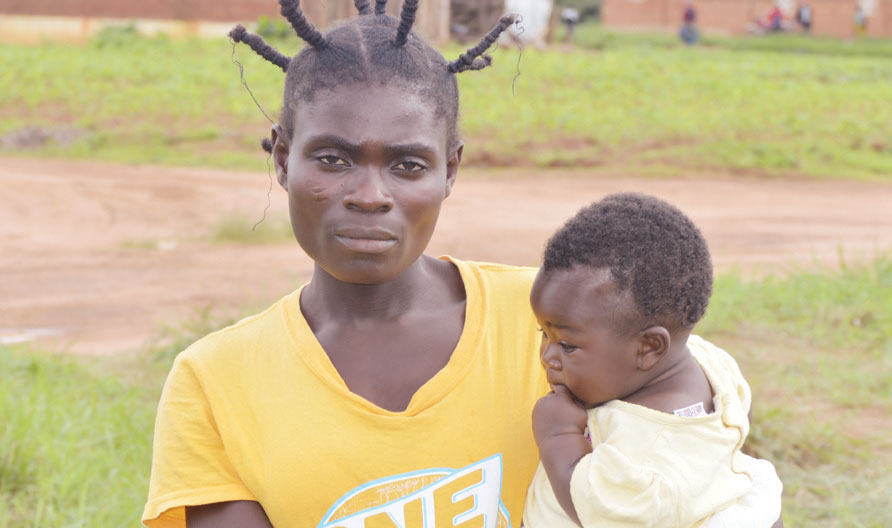Stella Ndhlovu, a mother of two, residing in Nkhoma Village,Traditional Authority Kampingo Sibande in Mzimba District, replies to a greeting with great gusto—flashing a cheek-to-cheek smile.
However, when asked if her first born underwent early childhood development education, her face quickly dims and hardens with apparent feelings of powerlessness.
“Yes, for a few months at a privately run centre which later disbanded, “she recalls. “I used to pay K2 000 monthly. Considering my weak financial status, that was a massive sacrifice.”
Ndhlovu, who briefly falls silent, stares into the eyes of her second child on her lap—seemingly traumatised to say more.
The 19-year-old, a primary school dropout, says she wishes her children achieved more academically.
However, she views the lack of childcare centres in her village as a stumbling block.
“Early childhood education makes children adapt to learning easily. It’s unfortunate that my children do not stand a chance to benefit,” she says.
Ndhlovu’s despair is also the tale of millions of parents in a country where 53 percent of the eligible children do not have access to early childhood education.
However, the country’s efforts to build a strong childcare system seem not to be delivering the desired goods.
It has just come to light that a multi-billion kwacha project designed to improve childcare services is stuttering following stagnation in community-based childcare centres (CBCC) construction and failure to supply nutritional requirements to children.
The findings, by the co-implementer Civil Society Nutrition Alliance (Csona), are presented in its comprehensive scorecard administration report which analyses the Investing in Early Years for Growth and Productivity project performance.
The World Bank-funded project rolled out in the country in 2018 and is set for completion this June.
It is being implemented in two traditional authorities of each of 13 selected districts.
The report also highlights lack of transportation facilities to facilitate the implementation of some project components, poor caregivers training delivery and inadequate supervision as additional challenges facing the project.
On CBCCs, Csona points out that out of 13 districts, only three have finalised constructing the designated structures. The report reads in part: “Most CBCCs remain unfinished, either at the window installation or roofing stage.
“Only the districts of Mangochi, Chiradzulu, and Mchinji have successfully completed the construction and handed over the completed CBCCs to the district council.”
Other districts implementing the project are Thyolo, Likoma, Mwanza, Rumphi, Dowa, Ntcheu, Neno, Chikwawa, Machinga and Zomba.
Csona, in the dossier, attributes the delay to contractors abandoning the work before completion and communities’ limited knowledge on holding duty bearers accountable.
According to the report dated November 2023, it was officially presented to the Ministry of Gender as the lead project implementators, last Tuesday.
It further exposes poor workmanship in the CBCCs construction.
The report quips: “In districts such as Thyolo where construction was finalised, beneficiaries have expressed concerns about the quality of workmanship as the CBCCs developed structural cracks before they could even be put to use.”
On transportation challenges, the report says beneficiaries have emphasised the significance of distributing bicycles to promoters, noting its role in enhancing service delivery.
“This is particularly evident in the execution of social and behaviour change communication campaigns, such as the promotion of exclusive breastfeeding and the encouragement of using pesticide-treated bed nets.
“Notable instances of this impact have been observed in various regions, including Ntcheu, Likoma, and Mangochi,” the report adds.
The report establishes that some districts were not distributing earmarked supplements.
“In Chikwawa, Mwanza, Mchinji, Ntcheu, Rumphi, Likoma, and Mangochi, there is a lack of implementation in providing iron and folic acid, deworming tablets and multiple micronutrient powder,” it details.
In a response to our questionnaire, Ministry of Gender spokesperson Pauline Kaunde said 150 CBCCs were expected to be constructed under the project, but 72 have been constructed.
She stated that the ministry engaged 10 contractors for construction of 15 CBCCs each in the designated districts.
However, due to poor progress by some contractors, the ministry terminated contracts for contractors in Rumphi, Chikwawa, Ntcheu and Dowa.
“Contractors for Mangochi and Mchinji finished on time, which meant 30 CBCCs were completed.
“The ministry re-engaged contractors for Thyolo, Machinga, Neno and Chiradzulu and to date only Machinga has not completed but the other three contractors finished their construction works. Thyolo is remaining with one CBCC,” she outlined.
She added that the ministry re-advertised for construction works in Dowa, Rumphi , Ntcheu and Chikwawa and it is waiting for approval to handover the contractors to district councils.
The National Planning Commission, the African initiative, the African Institute for Development Policy and the Copenhagen Consensus Centre are implementing the research-based project.
The post Multi-billion childcare project stumbles appeared first on The Nation Online.
 Moni Malawi
Moni Malawi 
